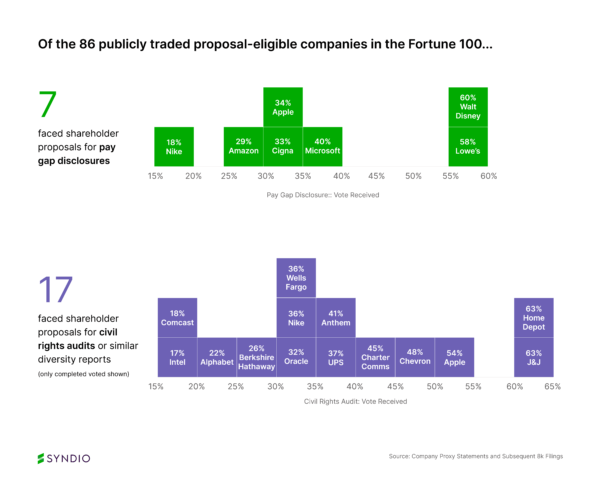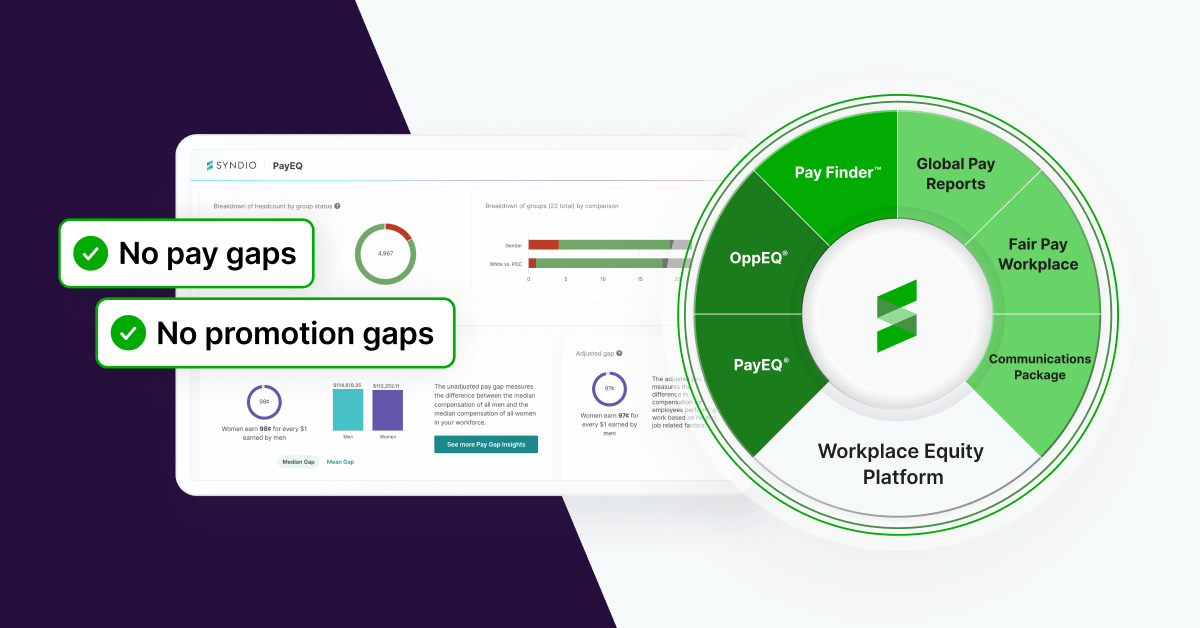Proxy season, or the time in which publicly traded companies hold shareholder meetings (usually between April and June), is wrapping up. This year, we were watching two types of shareholder proposals with great interest: those requiring unadjusted pay gap disclosures, and those proposing either racial equity audits or disclosure of workforce demographic statistics. As pay equity and pay transparency begin to make their way to the forefront of social issues and business strategy, there is increasing pressure from shareholders to prioritize these areas.
To get some insight into the appetite for these proposals, we analyzed* the proposal and voting trends for the Fortune 100’s 2022 proxy season.
The big takeaway? Social reporting proposals not only passed for several companies, but what’s equally interesting is the impact on companies where they aren’t yet passing. In these cases, shareholders are showing strong support, and many companies are taking proactive measures to ward off the necessity of taking such decisions to a vote next year.
Pay gap disclosures are on the rise
Social factors and shareholder proposals requiring companies to disclose both adjusted and unadjusted pay gaps aren’t anything new. They’ve been featured in the proxy season since 2015. By our count, 23 of the F100 currently disclose their pay equity statistics, also known as their adjusted pay gap, comparing workers in similar roles and location to get a statistically controlled difference between groups that allows for remediation.
Only a handful — Pfizer, Citigroup, Dow, and American Express — disclose their median pay gap (the so-called unadjusted pay gap), reflecting the difference in typical earnings between women and men or white and BIPOC employees. According to activist investor Arjuna Capital, three others have voluntarily committed to disclosing unadjusted pay gaps in 2022: Microsoft, Home Depot, and Target.
This year, seven F100 companies faced pay gap disclosures. At two of the F100, the pay gap report proposals succeeded: Walt Disney and Lowe’s. At Apple, Amazon, and Cigna the proposals earned around 30% of votes, and 18% at Nike. The proposal fared better at Microsoft though it was not successful with 40% of votes. However, Microsoft has agreed to begin disclosing the pay gap to avoid future proposals.
Racial equity audits & diversity reporting continue, but will they last?
Another continuing trend this season is shareholder pressure to conduct civil rights/racial equity audits, or to increase their diversity reporting. In the 2022 proxy season, 17 companies on the F100 faced such shareholder proposals, of which Amazon, Apple, Home Depot, and Johnson & Johnson committed to conduct audits. (Note: Amazon’s proposal vote was withdrawn after the company agreed to a racial equity audit).
The proposals nearly passed at Chevron (48%), Charter Communications (45%), and Anthem (41%). Proposals at UPS, Wells Fargo, Nike, and Oracle received over 30% of the vote, while similar proposals at Berkshire Hathaway, Alphabet, Comcast and Intel all did poorly. Tesla, which had a rough year in terms of reports of racial equity in the workplace, will face a vote on a civil rights audit proposal on August 4.
Microsoft shareholders faced slightly different proposals: one related to sexual harassment policies (which passed with 78% of the vote) and one regarding the racial impact of background checks in hiring (which received only 14% of the vote). Kroger faced a shareholder proposal that is part pay gap, part racial equity proposal — proposal 8 is for a report that “should address to what extent the Company’s workforce strategy includes competitive wage, benefit, and safety conditions for all its associates across all racial and gender demographics.” It failed to pass, but managed to receive 30% of the vote.
This new wave of racial and civil rights audits can be a lot more work than the previous proposals, which have just asked for additional statistics to be disclosed. In a typical civil rights audit, a third party assesses how legal protections for historically disadvantaged groups play out in the workplace, helping to evaluate how a company’s policies and practices square with their public statements and commitments.
So what is the ‘S’ in ESG? It’s the social aspect of Environmental, Social, Governance (ESG) investing strategies — and a major trend among F100 shareholders right now. It will be interesting to watch how shareholders and companies respond to social issues, and how they turn these commitments and audits into meaningful change for groups that have historically lagged in labor market outcomes like employment, management and leadership representation, and earnings.
What the F100 proxy season means for employers
This was a notable Fortune 100 proxy season for the ‘S’ in ESG. Companies face continued pressure to take action and be more transparent around pay and racial equity, and it’s not just investors and shareholders probing. Employers are facing pressure from their own employees and policy makers across the country. With the likes of Disney, Apple, and Amazon shifting to report out more of this data, employers big and small should take this F100 proxy season as a signal that these demands are here to stay.
*Methodology
Syndio reviewed the annual proxy statements of publicly-traded companies on the F100 list. The vast majority have their shareholder meetings, including voting on any shareholder-submitted proposals, during the first half of the year. In the few cases where 2022 reports are not available, we reviewed 2021 proxy statements. Several companies faced initiatives that used much of the language of civil rights/racial equity audits, but are based on potential reverse discrimination against employees deemed as “non-diverse.” We did not count these proposals, though we did include some that were similar in tone to the more typical racial equity claims, such as UPS & Intel.
We relied first on Arjuna Capital’s 2022 Racial and Gender Pay Scorecard for our assessment of pay gap disclosures. For companies not listed on the scorecard, we searched their websites, DE&I, ESG, CSR, and/or impact reports for mentions of pay equity and pay gaps. Several companies describe their commitment to pay equity without any statistical disclosure. A handful, such as Alphabet, describe zero statistically significant gaps in similarly situated groups. In these cases, we followed Arjuna Capital’s approach and counted these companies as not disclosing adjusted pay gaps.



